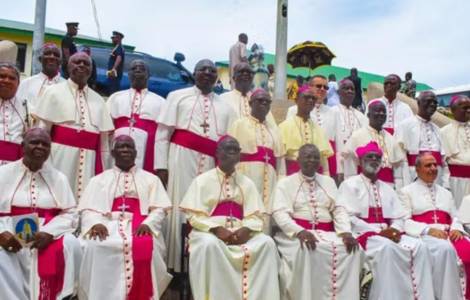
Accra (Agenzia Fides) - "The massive uncontrolled corruption is suffocating the nation", said the President of the Ghana Episcopal Conference and Bishop of Sunyani, Matthew Kwasi Gyamfi, in his opening address to the General Assembly of Ghana's Bishops. "It appears corruption is legalized. What should Ghanaians do since the existing form of democracy help only a few and leaves the majority behind? What about the impunity and arrogance of some politicians and their defence of corruption?" Bishop Gyamfi noted.
The considerations of the President of the Episcopal Conference of Ghana should be read in light of a 2022 UNODC (UN Office for the Fight against Drugs and Crime) report entitled "Corruption in Ghana, People's Experiences and Views" which is based on surveys of Ghanaian citizens. According to the study, which covers the year 2021, eight out of ten citizens had contact with public officials that year. Of the total number of adults who had at least one contact with a public official in 2021, 26.7 percent either paid a bribe or were asked to pay a bribe but refused. In 2021 alone, the total number of “bribes” collected by public officials reached 17.4 million. The group of citizens (29.9 percent of cases) most affected by the demands of corrupt officials is the 24-35 age group, followed by young adults looking for work or starting their own business from the 18 to 24 year old age group (23.9 percent of cases). The highest percentage of bribery solicitation cases involve police officers and agents (53.2%), followed by immigration (37.4%), customs (33.6%) and other categories. Politicians are at the bottom of the list with a bribery rate of 2.9%. Almost half of those who have paid a bribe say they did so to expedite or complete an administrative procedure. This misconduct is so widespread that the majority of respondents believe that an administrative procedure cannot be carried out without paying a bribe. The UNODC report also indicates that several public officials were hired through forms of nepotism or corruption without undergoing an interview process. Last but not least, corruption contributes to the general impoverishment of the population in a country that is also rich in natural resources. "What explanations can the two political parties give to Ghanaians for the unfavourable agreements we sign on our oil, minerals, power generation etc.? Countries that have these resources in abundance are rich. Why do we remain poor?" asks Bishop Gyamfi, referring to the opacity of the contracts that the government in Accra has signed with some foreign companies. (L.M.) (Agenzia Fides, 15/11/2023)